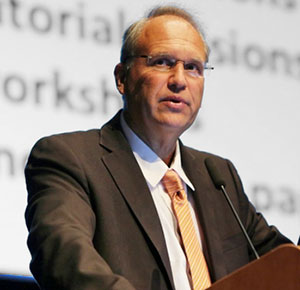Carlos Canudas de Wit - Scales Paradigms in Control & Estimation of Large-scale networks
- Keynote Speech

Carlos Canudas-de-Wit was born in Villahermosa, Tabasco, Mexico. He received his B.Sc. degree in electronics and communications from the Technological Institute of Monterrey, Mexico in 1980. In 1984 he received his M.Sc. in the Department of Automatic Control, Grenoble, France. He was visitor researcher in 1985 at Lund Institute of Technology, Sweden. In 1987 he received his Ph.D. in automatic control from the Polytechnic of Grenoble (Department of Automatic Control), France. Since then he has been working at the same department as "Director of Research at the CNRS", where He teaches and conducts research in the area of control systems. He is the current leader of the NeCS GIPSA-Lab (CNRS)-INRIA team on Networked Controlled Systems. He has established several industrial collaboration projects with major French companies (FRAMATOME, EDF, CEA, IFREMER, RENAULT, SCHNEIDER, ILL, IFP, ALSTOM). He has been associate editor of the IEEE-Transaction on Automatic Control, from 1992 to 1997, AUTOMATICA, from 1999 to 2002. He is currently Associated Editor of: the Asian Journal of Control (since 2010), IEEE Transaction on Control System Technology (Since 2013), and the IEEE Transaction on Control of System Networks (since 2013). He holds the presidency of the European Control Association (EUCA) for the period 2013-15, and served at the IEEE Board of Governors of the Control System Society 2011-2014. He holds the ERC Advanced-Grant 2015 Scale-FreeBack <http://www.gipsa-lab.grenoble-inp.fr/%7Ecarlos.canudas-de-wit/ERC.php>for the period 2016-2021. He is IEEE-Fellow of the IEEE Control System Society. He is also IFAC-Fellow. His research publications includes: 200 International conference papers, and 65 published papers in international journals, 5 books, 10 Book chapter, and holds 11 Patents.
In this talk we presents some results from the ERC Scale-FreeBAck on the problem of controlling aggregates of large-scale complex systems with a few inputs (micro-control). Aggregates here are “aggregated” variables functions of the systems state-space variables such as mean values (macro-outputs). Examples of such a class of systems are traffic networks, Brain neural networks, heating systems, among others. The basic idea is to devise a “virtual” aggregated model of the original large-scale system using the scale-free (SF) metric, which indicate that the degree distributions of the associated graph follows an exponential decaying law.Then, we discuss different partitioning algorithms leading to aggregated graphs with the SF desired distribution but also with the suited control/observation properties. In the talk, I also present the mathematical properties necessary for the average observability.The second part of the talk, presents a different alternative for cutting system complexity, which consist in representing a large traffic network as a continuum. That is, to approximate a large-scale dynamic graph (where each node represent a variable), by Partial Differential Equations. The objective of this second approach is to use the PDE model for designing boundary estimators and control.




